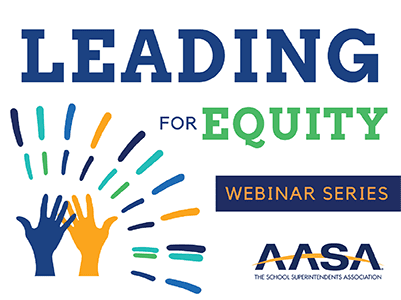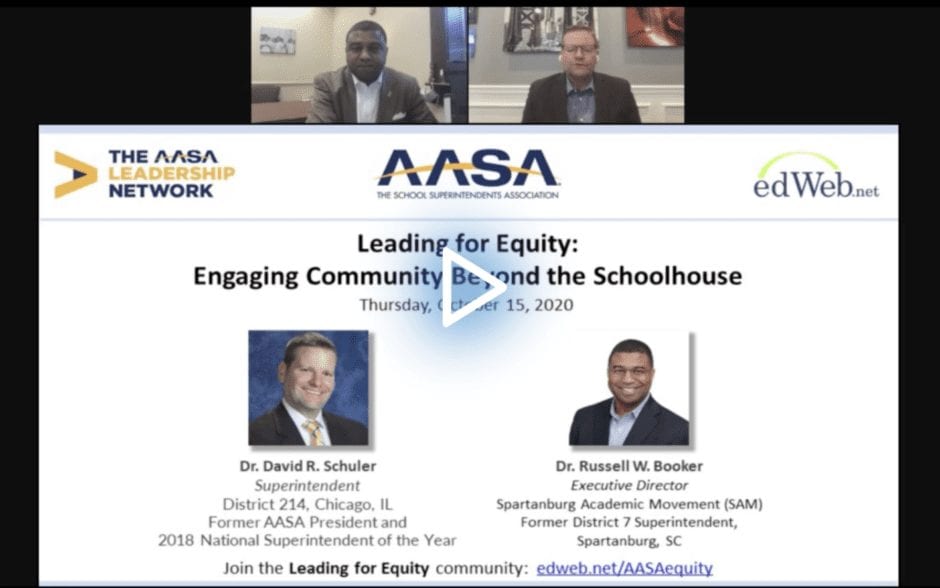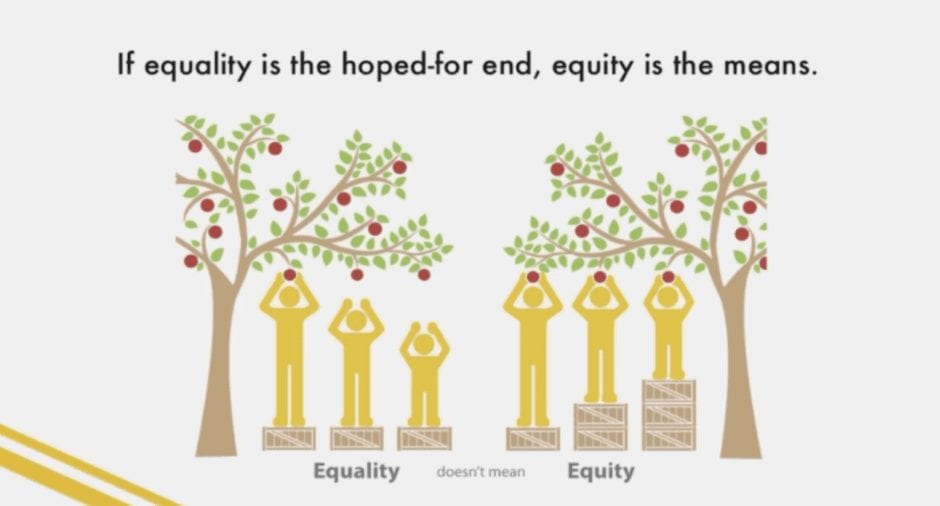Educating Students Equitably Through Collaborative Action
By Robert Low
Even before the COVID-19 pandemic led to changes in the traditional education model, there was widespread recognition that schools alone could not do everything needed to provide an equitable education for diverse students because so many factors that determine students’ success were being affected or determined outside of school.
In the new age of remote and hybrid learning, increased poverty, racial concerns, and widespread natural disasters, new ways of supporting students and helping them succeed in school are clearly needed. A process for taking community-wide collaborative action was explained by Dr. Russell Booker, Executive Director of the Spartanburg Academic Movement and former Superintendent, and Dr. David Schuler, Superintendent of District 214 in Illinois, during a recent edWebinar hosted by AASA, The Superintendents Association and AASA’s Leadership Network.
Key aspects of the process identified by Dr. Booker include sharing data and having honest conversations, not to play the blame game but to shine a light on what is working and identify areas where further change and growth need to occur.
Shifting the Vision and Process
Spartanburg is a city in South Carolina and also the county seat of Spartanburg County, which includes seven school districts. While the city’s population is almost equally divided between White and Black people, the county’s population is about three-quarters White. Despite the racial differences, Dr. Booker explained in recent years there has been a community-wide effort to improve the area’s competitiveness through education.
After a study revealed only 19% of Spartanburg residents had a baccalaureate degree, making it more difficult to attract good jobs to the area, a campaign was launched to double the number of residents with post-secondary degrees by 2030. This included a recognition that K-12 schools alone could not accomplish the goal, and instead a community-wide partnership was needed to provide support from birth through career.
Also needed was a process for achieving a collective impact through collaborative action, rather than just having individuals pursue their own approaches, or having different organizations working in different ways on goals that were aligned but not fully integrated. To have the maximum impact in the minimum amount of time, there needed to be a common agenda, data sharing, and constant communication.
This type of collaborative action was especially important because the birth-through-career approach requires the involvement of a broad array of organizations, not just K-12 schools. Health and housing agencies are needed to make sure there are safe births, good nutrition, and stable homes for young children so they are ready to start kindergarten and can continue to learn successfully. Head Start, preschools, community colleges, and other types of educational organizations also have important roles to play in this process, as do public safety organizations.
The community-wide effort reflects the recognition that successful students need to have or develop social, human, and financial capital, in addition to receiving an equitable and effective education. Social capital includes growing up in a supportive family structure where there are parenting skills, and human capital includes good health and access to medical care if needed. Financial capital includes the ability to become an employee or entrepreneur, own a home, and accumulate retirement savings. Education and community partnerships are needed to build all these types of capital.
Implementing the Vision and Process
Within the school system, Dr. Booker identified a number of key priorities, including reading in the early grades, math in the middle grades, and high school graduation. The next steps in the process of turning an equitable education into equal opportunity are post-secondary enrollment and completion, followed by employment.
Engaging and empowering parents to support the education process is a crucial element of success. Starting with prenatal care and then progressing through reading at home with young children and accessing information about students’ progress, many parents need to be educated about available resources and encouraged to use them. Family universities, along with family councils in which parents can provide input as well as receive information, can help make this happen.
Honest conversations are also an essential part of the process. The conversations will vary according to the community, but in the many American communities where there are racial minorities, the conversations need to have a focus on healing, reconciling, and achieving unity. This includes a data-driven discussion of racial disparities and a focus on eliminating policies that prevent students and other community members from moving forward together.
For the conversations and other aspects of collaborative action to work, Dr. Booker recommends creating “a comfortable space at work to have difficult conversations and extend some grace,” because different people will be at different places in the spectrum of awareness and perception.
This edWeb broadcast was hosted by AASA, The Superintendents Association and AASA’s Leadership Network, providing premier professional learning for educational leaders.
About the Presenter
Dr. Russell W. Booker, the Executive Director of the Spartanburg Academic Movement (SAM), believes our greatest hope for the future is to inspire and equip our children for meaningful lives of leadership and service. He received his bachelor’s degree in Education from Wingate University and his Ph.D. from the University of South Carolina in Columbia.
Lauded as a values-based leader and a champion for equity and education, Russell retired as Superintendent of Spartanburg County School District Seven after a 28-year career in education during which he garnered a wide range of regional, state, and national distinctions. He is a South Carolina Liberty Fellow and a graduate of the Diversity Leaders Initiative through the Riley Institute.
Russell, a Certified Diversity Executive, and his wife Sheryl recently founded One Acorn, an agency that helps organizations, individuals, and communities fulfill the potential within through enlightened, authentic, values-based leadership centered on collective impact for equity.
About the Host
Dr. David R. Schuler is the 2018 Illinois and National Superintendent of the Year. Known for his ability to inspire and build leaders, he spearheaded Redefining Ready!, the national movement to redefine what it means for students to be college, career and life ready while serving as the 2015-2016 President of AASA, The School Superintendents Association.
Dr. Schuler has served 20 years as a superintendent, 15 of which currently leading High School District 214, Illinois’ largest high school district, where he led the development of an innovative instructional philosophy around personalized learning experiences focused on career pathways, early college credit, and industry credentials that enables students to discover their futures while still in high school. In addition, District 214 now teaches computer science to all 12,000 students, and its six schools were among only seven in the nation to pilot an iOS app development curriculum, initiatives which were recognized by the Obama White House.
Dr. Schuler earned his bachelor’s degree from Carroll University and his master’s and doctoral degrees from the University of Wisconsin-Madison.
Join the Community
Leading for Equity is a free professional learning community on edWeb.net for school and district leaders who face many challenges leading schools and driving school improvement for all students, especially now with COVID-19.
The AASA Leadership Network drives superintendent success, innovation and growth, shaping the future of public education while preparing students for what’s next. We are the largest, most diverse network of superintendents in America. Passionate and committed, we connect educational leaders to the professional learning, leadership development, relationships and partnerships they need to ensure a long career of impact.
Robert Low has more than 30 years of educational publishing experience, ranging from editing and product management to online advertising and content development. He also works with edWeb.net to write articles on their professional learning edWebinars.







Comments are closed.